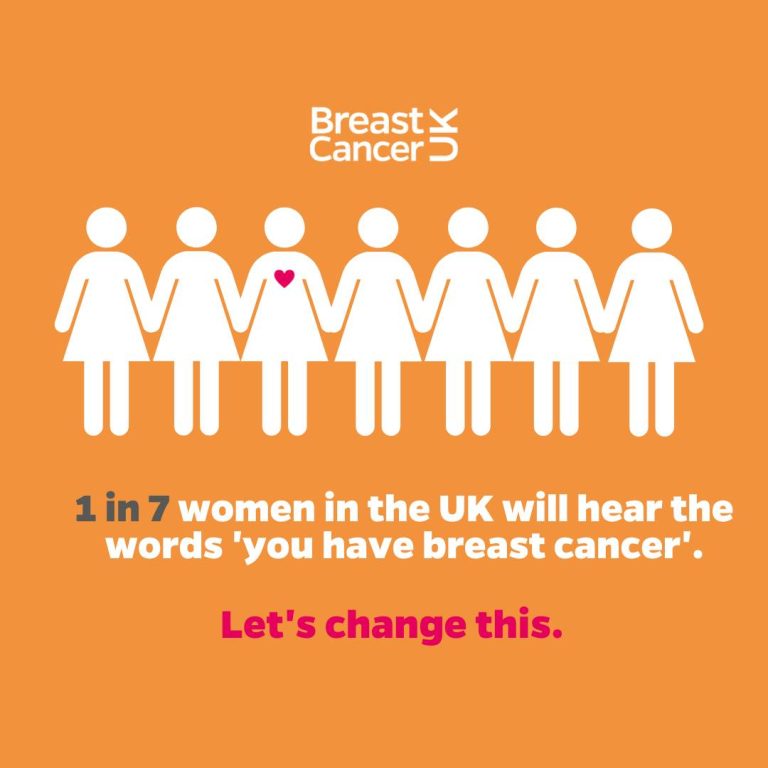October is Breast Cancer Awareness Month, an important global initiative that aims to educate, support, and empower individuals on breast cancer.
The treatment for breast cancer these days is highly effective, especially when the disease is identified early. As such, the more people that know about the signs of breast cancer and what to do, the greater the chance of survival.
Breast Cancer in the UK
Breast cancer is the most common cancer among women in the UK. There are approximately 56,000 new cases of breast cancer every year, so around 150 cases each day. While it’s not as common, men can also get breast cancer. 82% of breast cancers are diagnosed in women over 50.
Diagnoses and Early Detection
Early diagnosis is critical in the fight against breast cancer, as it significantly increases the chances of successful treatment. Regular breast self-exams and mammograms are essential tools in early detection.
Breast Self-Exams
Women of all ages should perform regular breast self-examinations. These simple checks can help identify any unusual lumps or changes in the breast, allowing for early consultation with a healthcare professional.
Mammograms
Mammograms (X-ray images of the breast) are crucial for early detection in women over 50. The NHS Breast Screening Programme offers routine mammograms for women aged 50 to 71 every three years.
Breast Cancer Symptoms
The first symptom most women will notice is a lump or thickening on the breast.
Other symptoms to look out for include:
- a change in the size or shape of one or both breasts
- a discharge of fluid from either nipple
- a lump or swelling in either of your armpits
- a change in the look or feel of your skin, such as puckering or dimpling, a rash or redness
- a rash (like eczema), crusting, scaly or itchy skin or redness on or around your nipple
- a change in the appearance of your nipple, such as becoming sunken into your breast
Most breast lumps are not cancerous but you should always see your GP if you detect one.
Breast Cancer Prevention
According to Breast Cancer UK at least 1 in 3 breast cancers are preventable. Breast cancer prevention involves lifestyle changes and understanding risk factors. While some factors like age and genetics are beyond one's control, there are proactive steps women can take to reduce their risk.
Healthy Diet & Exercise
Eating a healthy, balanced diet, engaging in regular physical activity and maintaining a healthy weight can all help to reduce the risk of breast cancer.
Limit Alcohol Consumption
Excessive alcohol consumption is believed to be linked to an increased risk of breast cancer. It's advisable to limit your alcohol intake.
Reduce exposure to harmful chemicals
There are many everyday products that can contain harmful chemicals including cosmetics, everyday sprays, such as those used around the house and in the garden, and plastics. Check the ingredients list and avoid products with paraben, triclosan and diethyl phthalate. Look for alternatives when it comes to plastic packaging as some may have Bisphenol A and phthalates.
Breast Cancer and the Elderly
The risk of breast cancer increases with age and elderly women can face some unique challenges in dealing with a breast cancer diagnoses.
Late diagnosis
Elderly women are often less likely to undergo routine mammograms, partly due to misconceptions that it's unnecessary at an older age. As a result, their diagnosis often occur at later stages, leading to more aggressive treatments and lower survival rates.
Presence of other medical conditions
Older women frequently have other health conditions, making it more complicated to treat breast cancer. Decisions regarding treatment have to be carefully weighed against their overall health.
Treatment Options
Treatment plans should be individualised, considering the patient's age, general health, and personal preferences. Lumpectomy, mastectomy, radiation therapy, and hormone therapy are among the options.
Emotional Support
The emotional toll of a breast cancer diagnosis is significant, and older patients may require additional support in coping with the psychological aspects of the disease.
Caregiving
Elderly breast cancer patients may rely heavily on caregivers, often family members, who will also need support and resources to provide appropriate care.
Breast Cancer Awareness Month is a crucial time to raise awareness, educate the public, and encourage proactive steps in breast cancer prevention and early detection. The statistics surrounding breast cancer in the UK are a stark reminder of the disease's prevalence and impact. It is important for women of all ages to take their breast health seriously and follow the recommended screening guidelines.
Elderly women, in particular, face distinct challenges when dealing with breast cancer, including late diagnoses, comorbidity issues, and complex treatment decisions. Providing tailored support and understanding their unique needs is essential to improving outcomes and quality of life.

